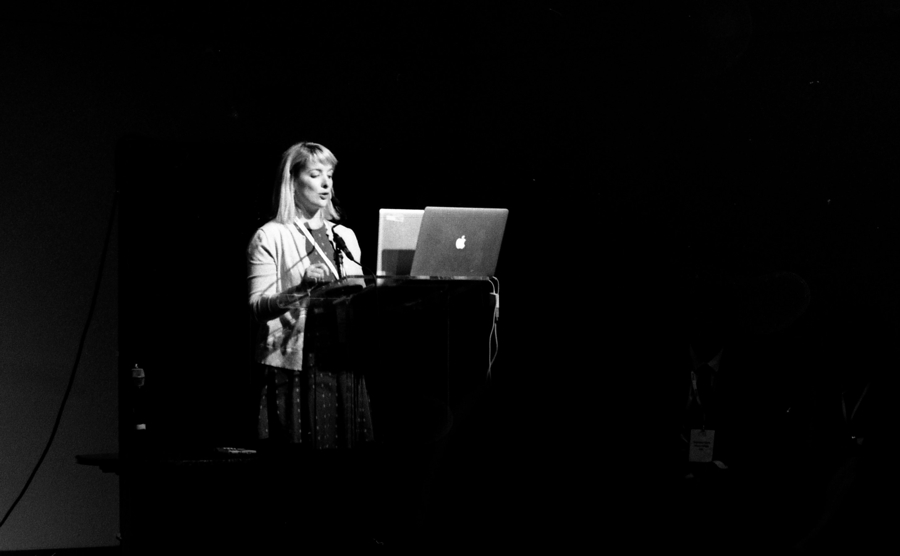
Sarah at the ISME conference in Glasgow
You’ve been teaching and researching and doing all of the things (all of them). You decide to take the plunge and submit an application for a conference. Your abstract is complete, you’ve edited your work, and you click submit. Then, after waiting for months, you receive an email that makes your stomach flip: “Congratulations! Your paper presentation/workshop/poster, has been accepted for presentation at the…”. You’re elated! You tell your friends and family the good news. And then, it hits you. You have to prepare a presentation. What should you say? How should you dress? What if people ask you tons of hard questions that you can’t answer? What if you’re revealed to be a fraud and shunned from the academic community forever? (Ok, maybe I’m the only one who has that last fear.)
I began my PhD in music education in 2011 and gave my first round of conference presentations in 2012. And, I was terrified. While I had been to workshops at conferences in the past, I had never attended research presentations. I had no idea what to expect. Feeling completely out of place, I asked others in my field to help me prepare. And then, I showed up. I stood in front of a group and shared my expertise. I received valuable feedback and forged relationships that I still have today. It was positive! It was empowering! And, no one called me a fraud (at least to my knowledge).
Since 2012, I have presented over 40 times at a variety of conferences (yes, I counted!) and have learned a lot along the way. I’m still learning. Here are five things I wish I knew before jumping on the conference circuit.
Note: My experiences as a researcher and scholar are limited to the field of music education. Every field is different and every conference is different. But, there are some universal truths shared below that can help you approach presenting at any space.

Sarah presenting in Corfu
Table of Contents
1. Know your conference and conference audience
What type of conference are you presenting at? Is it geared towards researchers? Practitioners? Is it formal? Laid back? Are there social events? If you haven’t attended this conference before, ask someone who has! Some conference details are very explicit about presenter expectation, even how to dress! (A conference I regularly attend in Florida encourages presenters to dress casual) Others provide little detail and it’s best to learn about the conference atmosphere from someone who attended it in the past.
In addition to knowing about the conference culture, it is helpful to know more about the typical conference audience. In general, who typically attends this sort of conference? AND, more importantly, who will be attending the conference this year? When the conference schedule is released, be sure to look at the list of presenters. Know the names of important researchers and practitioners in your area of study, especially if you are presenting as part of a larger group of sessions. And, don’t be afraid to do a little internet stalking quick google search to see what they look like. I remember attending one of my first international conferences and mistaking a famous researcher for someone else because I didn’t realize that he was, in fact, a he. After speaking to him for nearly an hour and finally catching his name, I realized that I was speaking to a researcher I had cited throughout all of my work! Based on his name, I assumed it was a female researcher, and never put the pieces together until after I made some embarrassing mistakes.
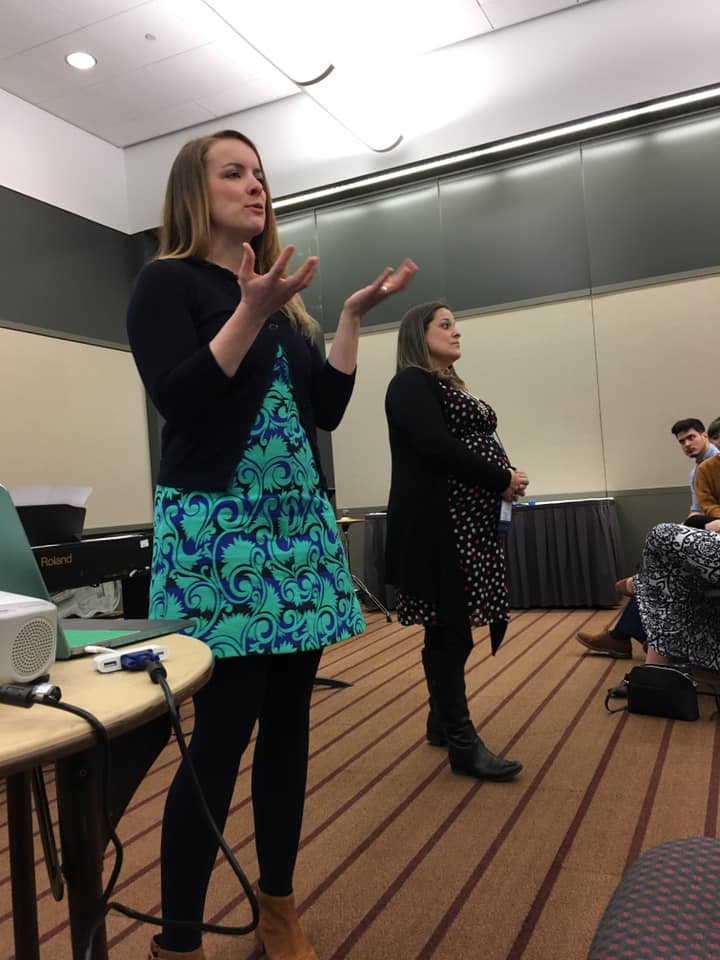
Sarah at the PMEA conference
2. Know the presentation space
What kind of a room are you presenting in? Do you need to bring your own equipment (sound equipment, projector, computer)? Will there be someone present to help you if you run into technical difficulties? How large is the room? Will session attendees be sitting at tables, desks, or in chairs? All of these considerations can help you build the best possible presentation. The room you are in could determine the way you construct your presentation. For example, if you are in a large space, a power point filled with text could be unhelpful. Instead, a high-contrast presentation with few words per slide could be better. Also, if you have a presentation with audio and/or video samples, be sure there will be a way to amplify the sound so that all can hear. This past spring, I presented in a room that was directly below a live performance (a jazz band!). The noise bleed was so significant that the videos I had prepared were quiet in comparison. In this case, a backup speaker would have been helpful.
Along with knowing the presentation space, the time of your presentation can determine how many people will attend your session. Is it early in the day? Towards the end of the conference? Are you stacked against many other presentations of similar content? Any and all of these questions can be directed towards the conference organizer. Don’t be afraid to ask their opinion and to get as many details as possible!
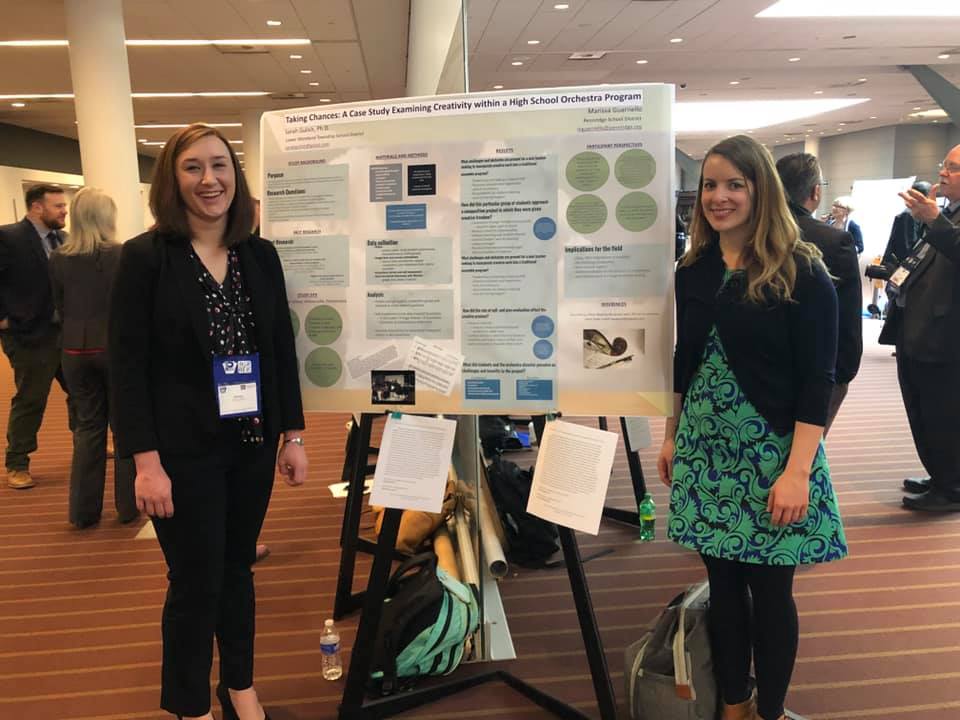
Sarah presenting joint work with Marissa Guarriello
3. Have backups for your backups
Technology will fail. It will! You need to have backups for your backups. And, know that what matters most is that you are sharing your content. If all of the electricity in the building you are speaking in fails, could you still share your work in a way that is engaging and meaningful (more on this in the next point)? The following tips have helped me manage and avoid technological “maydays”:
- Keep your presentation on a computer AND a flash drive.
- Put your presentation on a friend’s computer (or that of a kind stranger) who will be at your presentation. Make sure you are able to use their computer if your technology fails.
- Make sure all audio/video files are stored in a folder as well as embedded in your presentation.
- If using cloud-based presentation software (such as Prezi), be sure to download the presentation as well, in the event you have trouble accessing the WiFi.
- Practice presenting with different devices.
Overall, be prepared and do your best to create content that is easy to access and can be transferred to multiple devices.
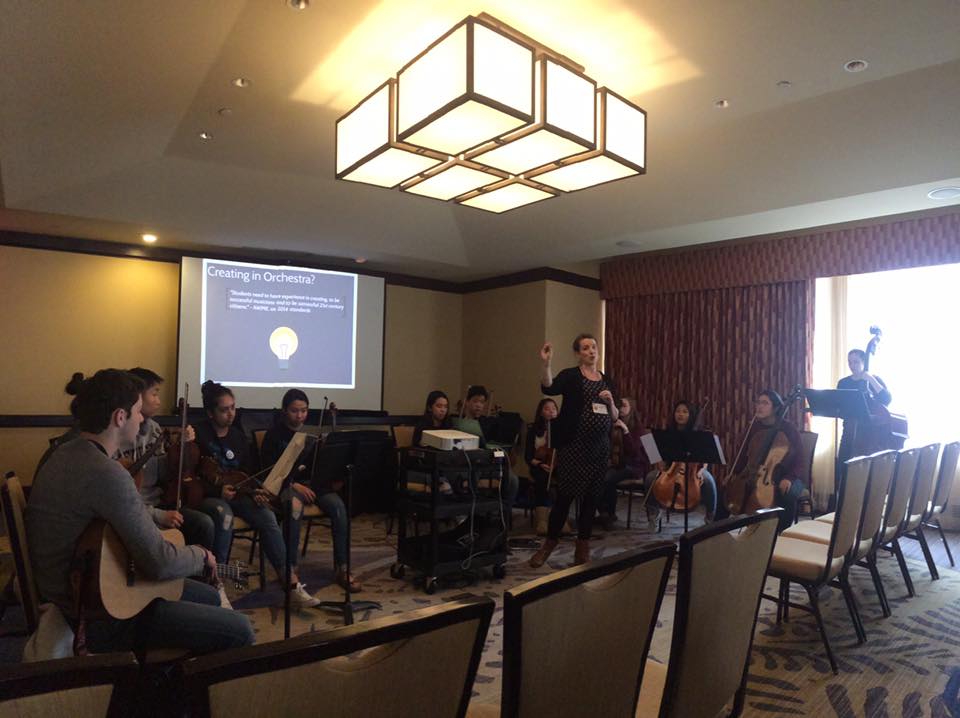
Sarah at PMEA with her String Orchestra students
4. Engaging content does not replace an engaging presence
I remember going to a conference a few years back. I was about to see a presentation from one of my favorite researchers. I loved his writing, I cited his work in most everything I did, and I couldn’t wait to hear him speak. And then, I was… disappointed. He read his research paper verbatim — barely raising his eyes to meet his audience. I was shocked! It was bland and boring. Others in the room seemed to feel the same way. He did such compelling work but presented it in a completely non-compelling way. You can have the most interesting content in the world. However, if you don’t engage your audience, your message will be lost.
If you feel uncomfortable speaking in front of others, practice doing it. Share your presentation with family, friends, and colleagues. Ask for feedback. Is it boring? Ask for advice for how to make it better. What are you missing? What could you add? Are there superfluous details that detract from your message?
I have rarely sat at a conference presentation and thought, “They need more content.” Usually, the opposite is true. I am lost in a barrage of figures and details that are plowed through at break-neck speed without a moment to regroup. Yes, your methodology is important. Yes, the details of your study are essential to the findings. But, remember that a presentation needs to be fundamentally different from a paper in that YOU are there to present it. What can you provide by way of presentation that brings your study or topic to life? How can you provide content that is impactful and yet still gives space for attendees to process and absorb what you are sharing? Remember, you can always enter into a denser dialogue both at the end of the presentation and after.
5. You are not defined by your performance
I was listening to a famous comedian in an interview. He was attempting to answer the question, “what does it feel like to bomb?” If you aren’t familiar with the terminology, bombing in comedy is essentially performing a set that gets no laughs. And, even though you are bombing (and know you’re bombing), you have to forge ahead. In the past 7 years of presenting, I have had some amazing and some extremely uncomfortable presentations. There was the time I presented a workshop and only two people showed up. Or, the time I was halfway through an hour-long workshop only to receive the question, “Ok, but what does any of this have to do with elementary general music?” (The answer was “nothing.”) In that moment, I realized my session had been mislabeled by the conference organizers and I was speaking to an audience of 200 music teachers hoping for tips on teaching young children and instead were receiving information about my work in higher education. And, there was the infamous presentation in which some colleagues and I performed pop music… in a well-lit conference room… in the middle of the day… to a roomful of folks wearing suits and ties… at what turned out to be a very up-tight sort of conference. (Did I mention I was 8 months pregnant?)
When a presentation feels like a mistake, I need to remember why I do this and know that I am not defined by my performance. Just as I encourage my students to take risks and make mistakes, I have to be OK with doing the same. And, focusing too much on myself and my performance detracts from the purpose of my work. If my research, writing, and professional development is aimed to help reach more students through music education, then the content I share should point towards that goal. It’s not about me. Even if I don’t have the perfect presentation, the work I share could still impact those in the room in a powerful way.
—
How about you? What fears do you have going into your first conference? Or, for seasoned presenters, what pieces of advice would you give to someone preparing for their first conference presentation?

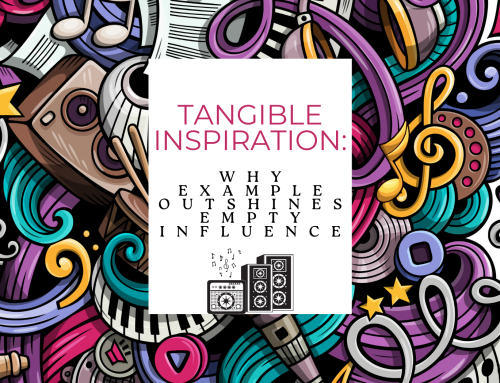
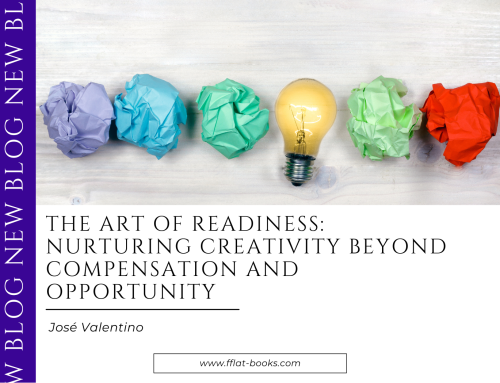
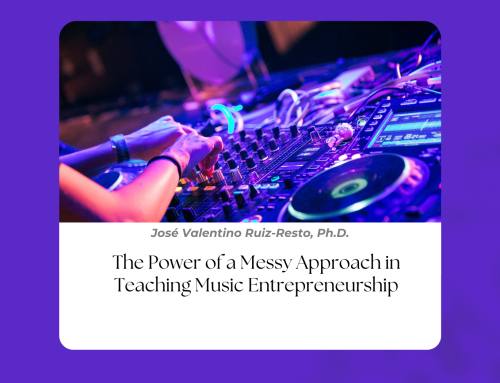
Leave A Comment